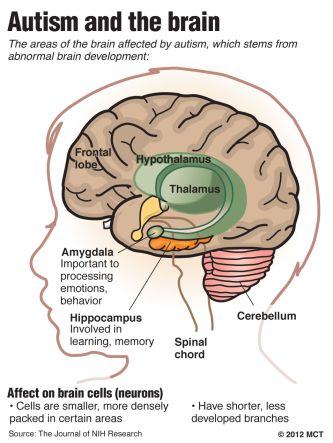
One out of 166 children will be diagnosed with autism each year. When a child is diagnosed, a family’s life turns upside down and can affect how the rest of their lives will be.
This reality was all too true for the family of Zoe White, now 10 years old. During Zoe’s first year of life, her mother, Karen Newberg, knew something was different about Zoe.
“I would say ‘don’t do that, rain girl,’ she would hit herself in the head,” Newberg said.
Newberg brought her daughter to see doctors and specialists to find out why Zoe acted the way she did and was developing the way she was. Newberg first got the diagnosis that Zoe had autism when she was 3 years old.
“I was not shocked,” Newberg said. “I was sad and angry but not shocked.”
Newberg explained that autism is a “bio-neurological disorder that is broken up into different parts of what is called a spectrum.”
Autism makes it harder for the child to communicate and think critically. Autism ranges from severe, low-functioning to the less severe, high-functioning. Low-functioning autism is known as pervasive developmental disorder not otherwise specified (PDD-NOS), where the child is non-verbal and anti-social. High-functioning autism is known as Asperger’s Syndrome, where the child will be very gifted in an area of study or interest, yet still have social issues.
Everything in between is known as simply autism. Zoe is diagnosed with pervasive developmental disorder not otherwise specified (PDD-NOS).
Children with autism often will be diagnosed with other disabilities and problems, such as attention deficit disorder (ADD), attention deficit hyperactivity disorder (ADHD), anxiety, anger management problems and physical disabilities. Often, children with autism will have to be medicated to control the other disabilities that they might have. Many children take medications that will help control their ADD and ADHD, such as Concerta, Ritalin, Adderall, Dexedrine, Strattera, Focalin or Attenade. They may also take anti-depressants and medications such as Paxil, Prozac Zoloft or the antipsychotic Risperdal to help manage their anxiety.
“We first started Zoe on medications when she was in kindergarten,” Newberg said. “They tried other methods of treatment such as therapies and diets so that Zoe wouldn’t have to be medicated but in the end, Zoe needed to be medicated so that she could function and make it through the day.”
Newberg did not want to medicate Zoe.
“When she is on the medication, it’s like she isn’t there anymore, she’s not herself,” Newberg said. “She is always so hungry and each medication has side effects, so it’s hard to manage.”
Zoe’s family has to watch her and make sure that she doesn’t overeat or make herself sick. Her entire family participates in the autism awareness walk in Philadelphia every year and do everything they can to help with Zoe.
Luckily for Zoe, she has a great support system and family members who have knowledge of what autism is and its effects. Newberg herself is a speech therapist at the Delaware County Intermediate Unit (or DCIU).
However, when Zoe was born, Newberg was a fifth grade teacher at an elementary school in Oxford, Pa.
Corinne Toth, Newberg’s aunt, is an itinerant teacher at the DCIU and she specializes in doing floor time therapy with children in the preschool age that have autism. Toth has been with Zoe from the time she was younger and has done a variety of therapies with her. Both Toth and Newberg stressed the importance of a good support system.
“First, we started working with Zoe and did basic social work,” Toth said. “Then, as she got older, we started working on academic and life skills. Zoe has a great support system that many families who have a child with autism don’t have. So Zoe is very lucky.”
Once Zoe was diagnosed with autism, Newberg, along with many of her family members, took the initiative to learn all that they could about autism. Newberg, Toth and her mother all go to autism information conferences and have taken further classes to learn more about autism. Conferences are held often in different places each time and speakers often come to the conferences. Sometimes they have autism, know someone with autism or are doctors specializing in autism.
“There is always something new about autism coming out,” Peggy said.
In the future, Zoe’s family has worries for her future as any family would have for their child. For Zoe’s life however, it is painful to look to the future.
“She won’t do the ‘normal’ things that kids her age do and as she gets older she will miss out on things like prom and marriage,” Peggy said. “She won’t have a job or be able to be on her own. She will be alone.”
Nobody knows what the future will be but for now, Zoe is happy.
“Zoe is a friendly, loving girl,” Toth said. “She is happy and loves life.”


